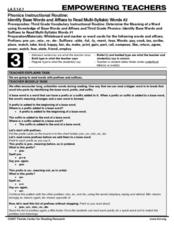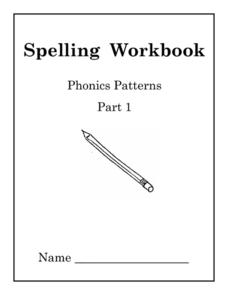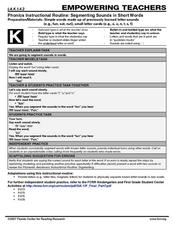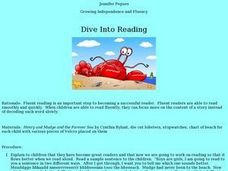Curated OER
Fluency: Read Regular Words
Second graders engage in a timed choral reading activity to practice reading with accuracy and fluency. The teacher starts the timer and taps a reading rhythm on the desk as the class reads a series of words in unison. When the time is...
Curated OER
Phonics: Identify Base Words and Affixes to Read Multi-Syllabic Words
Encountering a new an unfamiliar word can stump even the best readers. Third graders learn how to assess the base, prefix, and suffix of words to help them determine its meaning. The class works together to go over a series of common...
Curated OER
Phonics: Words with More Than One Syllable (CV/C) Rule A
Knowing basic phonics rules can help learners increase their reading accuracy, pronunciation, and spelling. Third graders practice breaking or chunking words based on the cv/c syllable rule. They take note of where to break each word,...
Curated OER
Phonics Instruction: Writing Simple Words
Sound it out, read it, then sound it out, and write it. Little ones work as a class to sound out simple words. After they have sounded out each word they will write that word on the white board. This is a great way to build a connection...
University of Texas
Essential Reading Strategies for the Struggling Reader
Beneficial for beginning readers, struggling readers, and those in need of review, a set of language arts activities is a great addition to any foundational reading unit. Focusing on phonological awareness, fluency, instructional...
Curated OER
Fun With Fluency
Practice reading with fluency by blending words together. To start, prepare flash cards with pseudowords on them (words that can be pronounced but have no real meaning), and work with the class to sound out the words using known...
Kathryn J. Davis
Spelling Workbook: Phonics Patterns
Set your pupils straight with spelling and sounds by using these materials for practice. Included here are three booklets and workbooks that cover just about any sound or blend you could think of!
Curated OER
Phonics Instructional Routine: Read and Write Words with Consonant Digraphs
Use consonant digraphs to introduce learners to word patterns and high frequency words. They observe a chart with the digraphs /sh/, /ch/, /th/, and /wh/. After listening to each of these phonemes, scholars watch as the teacher...
University of Texas
Alphabetic Understanding, Phonics, and Spelling
Have your youngsters reading in no time with with collection of literacy activities and lessons. Starting with a basic understanding of the alphabet, this unit progressively builds students' phonemic awareness and ability to decode...
K5 Learning
Musical Instruments to Play
Bring some music to your language arts lesson with a reading comprehension activity. Learners read an informational passage about different musical instruments before answering a series of comprehension and vocabulary questions.
Florida Center for Reading Research
Fluency, Letter-Sound Correspondence, Make a Match
An activity tests the fluency skills of young readers. Scholars match initial sound cards to letter cards. Pairs take turns and work to locate the most matches before the timer goes off. The activity ends with a peer evaluation.
Curated OER
Phonics: Decoding Words in Connected Text
Decoding words in connected text can make emergent readers really feel like they are great readers. They work as a class to sound out simple cvc words located in super short sentences. Tip: Extend this activity by having a variety of...
Curated OER
Phonics: Decode and Write Words
Sounding out individual phonemes and blending them to make a word is usually one of the first tasks mastered when learning to read. Make master decoders out of your learners, they sound out a series of simple two and three-letter cvc...
Curated OER
Phonics: Decode and Write Words with Blends
Kids see, say, then count the phonemes they hear in a series of simple words. They practice counting phonemes with the teacher, then sound out the same word on their own. As they count each phoneme they write it down on their paper. A...
Curated OER
Phonics: Read and Write Words with a Consonant Blend
Reading often times starts with phonemic awareness and letter sound correspondence. Get little ones blending those letter sounds together to read and write simple words. As the teacher sounds out each word, learners count phonemes, and...
Curated OER
Phonics: Segmenting Sounds in Short Words
F-u-n spells fun. It is a simple word that little learners can sound out as they build phonemic awareness and those early reading skills. This short scripted lesson provides teachers with the basics for teaching how to sound out...
Curated OER
Oral Reading Fluency: Reading Text with Proper Expression
Kids practice reading fluently with expression. They listen closely as their teacher reads a short paragraph, take note as she points out how she read each sentence, and then read along with her. They read to passage several times until...
Curated OER
Dive Into Reading
Learners observe and demonstrate various reading strategies to improve their reading fluency. The teacher first models smooth speech. In pairs, pupils take turns reading from the book Henry and Mudge and the Forever Sea by Cynthia...
Curated OER
Using the Sounds of Words Reading Task
Young readers demonstrate phonemic awareness in words and blends, and recognize 100 high-frequency words. Use a nursery rhyme to point out rhyming words, and change the words by putting a new letter at the beginning. Each learner will...
Reading Resource
Painting Sentences
Paint with the colors of reading! Learners in special education classes or mainstream classes practice decoding basic and advanced code with a series of sentences on paint blobs. Once they read the sentence, learners cover one spot on...
Curated OER
Using Initial Sounds and Picture Clues to Read Unknown Words
Kindergarteners read the bold words that are unknown by using the strategies of initial sound and picture clues. They meet individually with their teacher in order to assess this concept. Excellent resource!
Curated OER
Fluency: High Frequency Words
Boy, this instructional activity sounds like a high frequency blast. If you think that sounded sarcastic, it was. Learners watch as the teacher reads the high frequency word..... the! They read the word with the instructor over and over...
August House
Why Koala Has a Stumpy Tail
Learn about the animals of Australia with a language arts activity about an Australian folktale called, Why Koala Has a Stumpy Tail. After reading the story as a class, kids discuss events and characters from the book, retell the...
Houghton Mifflin Harcourt
Friends Together: Extra Support Lessons (Theme 4)
Friendship is the theme in this series of extra support lessons. With a variety of resources (practice worksheets, letter, word, punctuation and picture cards), young readers gain knowledge of initial consonants v and h, blending short...

























